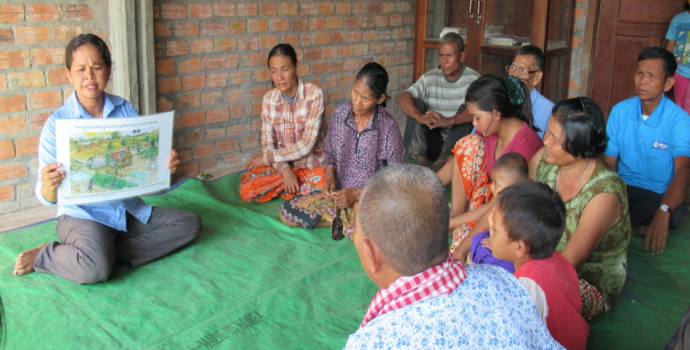- About Us
-
Who we are
-
- Publications
-
- ADPC Academy
-
MediaADPC'S NEWS
The grain of the matter - International Day of Rural Women 2020 The grain of the matter - International Day of Rural Women 2020
15 Oct 2020
Nokor Pheas, Cambodia

Ms. Chheun Kimsean, Council Member in Nokhor Pheas, Cambodia, discussing sustainable farming with commune residents.
Chheun Kimsean has been a council member of Commune Committee for Disaster Management (CCDM) since 2004. She realized the need for women to take on an active role in agriculture when she started her own family.
“I joined the commune council and became in charge of supporting women and children because I knew that they were essential in better farming practices,” she explained.
A FAO national study has shown that if women had equal access to productive resources, services, and opportunities, such as land, livestock, financial services, and education, they could increase the yield in their farms by 20-30%. Additionally, 75% of women in Cambodia are employed in agriculture.
Chheun represents the path towards equal representation - she is the only woman in the local council of eight. Women make up less than 15% of the elected rural council in Cambodia.
The councilwoman started the change in her own backyard. “I used my knowledge from disaster risk management to restore a pond near my house, create home gardens amongst the households, and share the best practices for adaptation,” she said.
The council member is one of the many CCDM members who participated in the training courses organized by Partnership for Development of Kampuchea (PADEK). Chheun participated in training activities and sessions that demonstrated field practices such as the ways to use the Hazard, Vulnerability and Capacity Analysis (HVCA) Tools to collect data.
It Takes a Village
The CCDM members know that strength comes in numbers. “We started by bringing the village elders, youth, monks, and other influential members of the village together. The discussion began with using HVCA tools to collect data and conducting data analysis to formulate the Community Based-Emergency Preparedness and Response Plan (EPRP)/Contingency Plan (CP),” she said.
Chheun conducted seven sessions in 2017 and 10 the following year, “My first session was held with a group of 95 farmers and 63 of them were women. In 2018, 245 people attended my sessions and more than 70% of them were women. Seeing these women take a leading role is the greatest motivation to plan even larger sessions” she added.
Chheun sees better practices sprout in her village. She estimates that about 60-70% of farmers have adapted to better farming practices, “Farmers are now using System of Rice Intensification (SRI) techniques such as short-term rice seed. It is particularly effective for farmers with a small amount of land for rice cultivation. They have also learned to choose resilient crops that require less water during the dry season,” she explained.
Chheun has taken her commitment to building a stronger and more disaster resilient community to a national platform. She supports the strength that stems from unanimous dedication.
“We are here because of commune counselors, farmer’s participation, and support at the district level. It drives me to appeal to the government for an increased budget at the local level to implement communal Emergency Preparedness and Response Package (EPRP) effectively,” she said.
The community activist recognizes the significance of LNGOs. “The desire towards a more resilient community has a trickling effect. We are reminded of our potential when we see these organizations investing in our village,” she said.
Read the full story 'The Grain of the Matter' on ADPC's Asian Preparedness Partnership (APP) knowledge portal.
Latest NewsRelated Trainings
-